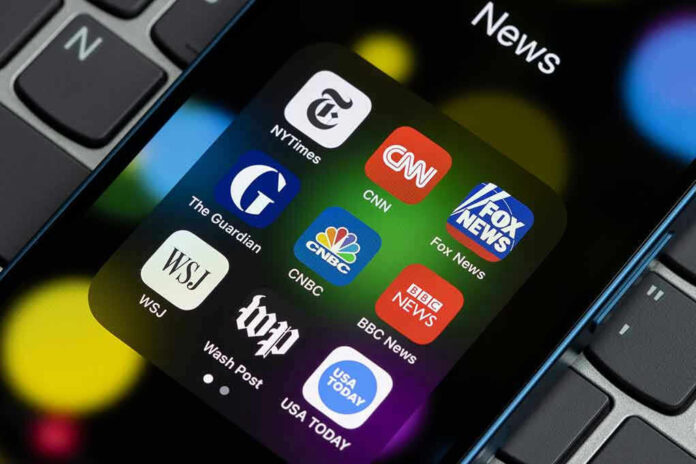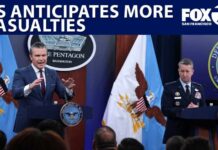The Wall Street Journal’s top reporter on Hezbollah has been exposed for publicly praising the terror group’s leaders and fuming against “the Israeli enemy”—and the mainstream media’s silence on this outrage is almost as shocking as the revelation itself.
At a Glance
- WSJ’s lead Hezbollah reporter, Adam Chamseddine, praised Hezbollah leaders and denounced Israel in public statements.
- The Free Beacon’s investigation raises serious concerns over journalistic bias and ethics in major Western media coverage of Middle East conflicts.
- Hezbollah remains a U.S.-designated terrorist group, and its portrayal in global media impacts international perceptions and policy.
- The Wall Street Journal has not publicly responded to the allegations about Chamseddine’s objectivity.
Wall Street Journal’s Hezbollah Reporter Under Fire for Pro-Terrorist Statements
Adam Chamseddine, a key freelance reporter driving the Wall Street Journal’s coverage of Hezbollah, has been caught red-handed on social media, repeatedly praising Hezbollah and referring to Israel as “the Israeli enemy.” These revelations come straight from a July 2025 analysis by the Washington Free Beacon, which reviewed Chamseddine’s public posts and statements. For years, Americans have raised alarms over media bias, but this case throws gasoline on the fire: a reporter tasked with informing millions about one of the world’s most dangerous terror groups appears to have openly cheered them on. If you want a reason to distrust legacy media, you can practically build a case study right here.
WSJ’s Hezbollah Coverage Led by Reporter Who Praises Terrorist Group’s Leaders and Fumes Against ‘The Israeli Enemy’. https://t.co/tTLPifFCyM
— CombsJC (@RedState66) July 28, 2025
Chamseddine’s role at the WSJ is not minor. He led much of the paper’s Hezbollah coverage throughout the latest escalation between Israel and terrorists on its northern border—coverage that shaped how Americans, lawmakers, and the world understood a conflict with deep implications for U.S. interests and global security. The Free Beacon’s analysis poured through his online record, finding not just “likes” but open praise for Hezbollah’s top brass and repeated condemnation of Israel. In any sane newsroom, this would trigger a five-alarm fire over ethics and conflict of interest. Instead, the Wall Street Journal has stayed mum, refusing—so far—to address whether readers can trust anything Chamseddine reported on Hezbollah.
Media Impartiality and Ethics Take Another Hit
Hezbollah’s history as a terrorist organization is not up for debate. The group, funded and armed by Iran, has a bloody track record targeting Israeli civilians and U.S. interests and is officially designated by the United States as a terrorist group. Yet, in Western newsrooms, scrutiny of bias evaporates the moment the “right” narrative is served up to the public. The Wall Street Journal’s reputation for impartiality is now on the line, with readers rightfully demanding to know how a reporter with a pro-Hezbollah record was handed the keys to Lebanon coverage. This is not just some minor slip-up; it’s a breach of basic journalistic ethics, and it strikes at the heart of whether the public can trust what’s printed about the world’s most dangerous flashpoints.
Media coverage of the Middle East has always been fraught with accusations of bias, but this case isn’t about a subtle slant or a poorly worded headline. The Free Beacon’s report provides direct quotes and social media evidence—hard facts, not opinion—demonstrating Chamseddine’s admiration for Hezbollah and antipathy toward Israel. In a time when the media lectures Americans about “disinformation” and “fact-checking,” it’s almost laughable to see how little checking is done inside their own ranks. If this story involved a reporter posting praise for a group on the U.S. terror list—any group other than those hostile to Israel—you can bet it would lead every nightly newscast. Instead, silence.
The Real-World Fallout: Conflict Reporting and Public Trust
The Free Beacon’s exposé is not happening in a vacuum. The latest round of fighting between Israel and Hezbollah, which dragged on for more than a year and finally paused with a fragile ceasefire in November 2024, is still shaping global headlines. The Lebanese Armed Forces, with indirect Israeli intelligence passed through U.S. intermediaries, are now under pressure to dismantle Hezbollah’s military infrastructure in southern Lebanon. Media coverage of these events influences everything from international aid to military strategy—and the opinions of American voters. When a reporter with a clear personal stake in the outcome is steering that coverage, the entire foundation of public trust in journalism erodes.
The immediate fallout could include internal investigations at the WSJ, new rules on vetting reporters, and maybe—just maybe—a little more skepticism from readers who have watched the legacy media fail time and again to live up to their own standards. In the long run, the risk is even greater: if readers lose faith that coverage of conflict zones is fair, accurate, and free from terrorist sympathies, the Fourth Estate’s role as a watchdog collapses. The Wall Street Journal, for its part, has so far refused to answer the basic question: how did this happen, and will they do anything about it?
Industry and Expert Reactions: A Crisis of Credibility
Media analysts and journalism scholars have long warned that personal biases—especially those undisclosed and aligned with violent extremist groups—can undermine the perceived objectivity of the press. In this case, the evidence isn’t circumstantial; the Free Beacon cites direct social media activity, available for all to see. While some defenders may argue that reporters with local knowledge offer valuable insights, that only works when transparency and impartiality are enforced. The public deserves to know whether the news they’re consuming is shaped by someone with a dog in the fight—or in this case, an open admirer of a group the United States has labeled as a terrorist threat.
The broader media industry now faces a choice: clean house and enforce basic standards, or keep running interference and risk losing the last shreds of public trust. For years, conservative Americans have warned about the dangers of unchecked media bias and the double standards that pervade newsrooms. This latest scandal just adds fuel to that fire—and proves once again why so many Americans are tuning out the so-called “mainstream” and demanding real accountability from the press.
Sources:
Washington Free Beacon analysis
Foundation for Defense of Democracies
WSJ social media (alternate locale)











